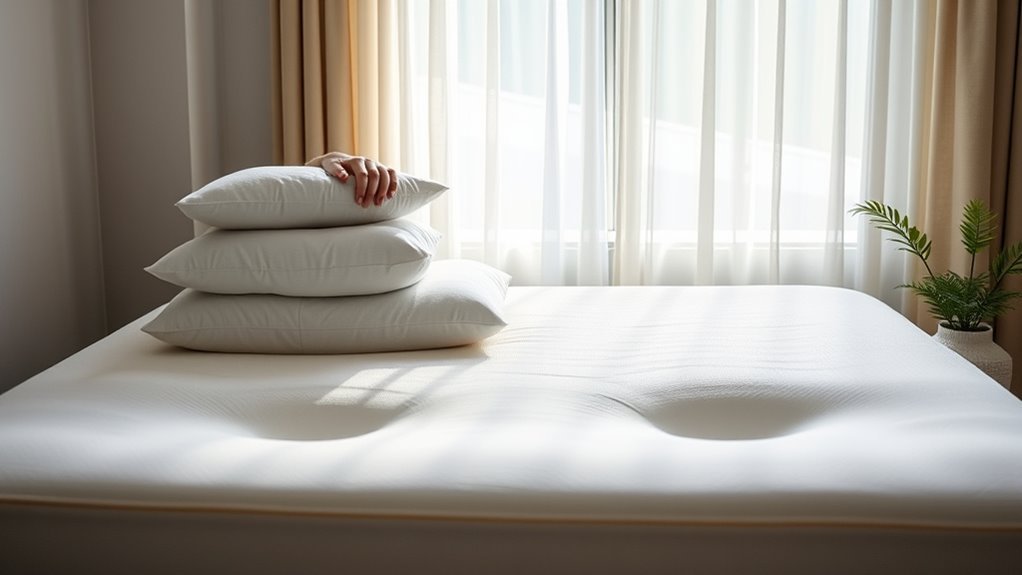If your mattress is causing shoulder pain while you sleep on your stomach, it’s time to reassess its support and firmness. A medium-firm mattress often balances comfort and alignment, reducing strain on your shoulders. Also, consider using a thinner pillow to maintain neck alignment. Positioning the pillow under your chest can further alleviate pressure. Keep an eye on wear signs, and if discomfort persists, exploring other strategies could lead to a better night’s sleep.
Understanding Shoulder Pain in Stomach Sleepers
When you sleep on your stomach, your shoulders often bear the brunt of the pressure, leading to discomfort and pain. This position can strain your shoulder anatomy, particularly the rotator cuff and surrounding muscles, as they’re forced into unnatural angles. The weight of your body compresses these areas, causing inflammation and soreness over time. You might find yourself waking up stiff or with a nagging ache, a clear sign that stomach sleeping isn’t doing your shoulders any favors. To reclaim your freedom from pain, consider alternative sleeping positions that support your shoulder alignment better. Understanding how your body reacts to stomach sleeping is the first step toward finding a more comfortable and restorative sleep experience.
Assessing Your Current Mattress
Your mattress plays an essential role in your overall sleep quality and can considerably impact shoulder pain, especially for stomach sleepers. Start with a thorough mattress evaluation. Lie down in your regular sleep posture and take note of how your shoulders feel against the surface. If you notice discomfort or pressure points, your mattress might not be providing the support you need. Consider the age of your mattress; over time, materials can degrade and lose their ability to support your body effectively. Additionally, assess whether your mattress aligns with your preferred firmness level, as this can directly influence your comfort and sleep quality. By understanding these factors, you can make informed decisions to enhance your sleep experience and alleviate shoulder pain.
The Importance of Mattress Firmness
Choosing the right mattress firmness is essential for achieving a restful night’s sleep and alleviating shoulder pain. For stomach sleepers, adequate mattress support is vital. If your mattress is too soft, it can lead to misalignment of your spine, increasing pressure on your shoulders. On the other hand, a mattress that’s too firm might not conform to your body’s contours, causing discomfort.
Understanding firmness levels helps you find that sweet spot. A medium-firm mattress often provides the balance you need, offering enough support while allowing for some give. This combination promotes proper alignment, easing shoulder pain and enhancing overall sleep quality. Prioritizing the right firmness can empower you to enjoy a more comfortable, pain-free sleeping experience.
Positioning Your Pillow for Better Support
Although many people overlook it, the position of your pillow can greatly impact shoulder pain during sleep. For stomach sleepers, finding the right pillow height is essential. A thinner pillow can help keep your neck aligned, reducing strain on your shoulders. Consider experimenting with various pillow materials, such as memory foam or down, to find what feels most comfortable for you. Memory foam can contour to your shape, providing support without elevating your head too much. Position your pillow under your chest rather than your head to alleviate tension. Ensuring proper alignment while you sleep can make all the difference in reducing shoulder pain. Remember, the right pillow can empower you to wake up refreshed and free from discomfort.
Exploring Alternative Sleeping Positions
Finding the right pillow can greatly improve your sleep quality, but exploring alternative sleeping positions can also play an essential role in alleviating shoulder pain. If you’re a stomach sleeper, consider shifting to side or back sleeping as sleeping alternatives. These positions promote better posture adjustments, reducing strain on your shoulders. For side sleeping, try using a thinner pillow to keep your head aligned with your spine. Back sleeping allows your shoulders to relax, reducing pressure points. If you’re hesitant to change, start by gradually incorporating these positions into your routine. Remember, it may take time to adapt, but prioritizing your comfort can lead to more restful sleep and less shoulder pain in the long run.
Choosing the Right Bedding Materials
When it comes to alleviating shoulder pain, choosing the right bedding materials is essential. You’ll want to take into account mattress firmness, as it can greatly impact your comfort and support. Additionally, opting for breathable fabrics and selecting the right pillow can enhance your sleep quality and help ease that discomfort.
Mattress Firmness Importance
Choosing the right mattress firmness is essential for alleviating shoulder pain, as it directly impacts your overall sleep quality. The right firmness level can support your body’s natural alignment, especially for stomach sleepers. Here’s what to evaluate when selecting:
- Support: A mattress that’s too soft can cause your shoulders to sink, leading to misalignment and pain.
- Pressure Relief: The ideal firmness balances support with enough give to relieve pressure on your shoulders and hips.
- Sleep Style: Different mattress types—like memory foam, latex, or innerspring—offer varying firmness levels, impacting your comfort and pain relief.
Finding the perfect mattress is about embracing comfort and nurturing your body, so you can wake up refreshed and pain-free.
Breathable Fabric Options
The right bedding materials can make a significant difference in how your body feels during the night, especially if you’re dealing with shoulder pain. Opting for breathable materials can help regulate temperature and enhance your overall comfort. Look for fabric types like cotton, linen, or bamboo, which wick away moisture and allow air circulation. These options can keep you cool and prevent overheating, further alleviating discomfort. Avoid synthetic fabrics that can trap heat and lead to restless nights. By choosing breathable bedding, you’re creating a more inviting sleep environment that supports your body’s natural alignment. Investing in the right bedding can be a game changer, helping you wake up refreshed and free from shoulder pain.
Pillow Selection Tips
Finding the right pillow can make all the difference in managing shoulder pain while you sleep. For stomach sleepers, proper pillow selection is essential to guarantee a restful night. Here are some tips to guide you:
- Pillow Height: Opt for a low-profile pillow to keep your neck aligned without straining your shoulders.
- Pillow Density: Choose a soft to medium-density pillow, providing just enough support without elevating your head too much.
- Material Matters: Consider memory foam or down alternatives for a comfortable feel that conforms to your shape.
When to Consider a New Mattress
If you’re waking up with shoulder pain or noticing visible signs of wear on your mattress, it might be time to contemplate a replacement. A mattress that’s past its prime can seriously impact your sleep quality, leaving you feeling unrested and sore. Typically, experts recommend replacing your mattress every 7 to 10 years, but your comfort and health should always guide your decision.
Signs of Mattress Wear
Over time, even the best mattresses can show signs of wear that signal it’s time for a replacement. If you notice any of these signs, it might be time to evaluate your options:
- Mattress Sagging: If you see noticeable indentations where you sleep, your mattress isn’t providing the support you need.
- Uneven Support: When you feel pressure points or your body sinks into the mattress unevenly, it can lead to discomfort.
- Increased Pain: If you wake up with shoulder pain or stiffness consistently, your mattress may no longer be meeting your needs.
Recognizing these signs can help you regain the restful sleep you deserve, allowing you to wake up refreshed and ready for the day. Don’t let an old mattress hold you back!
Impact on Sleep Quality
A worn-out mattress not only affects its physical condition but also greatly impacts your overall sleep quality. If you’re waking up with aches or feeling unrested, it’s likely time to reevaluate your mattress comfort. Your body needs proper support, especially as a stomach sleeper, to maintain a natural alignment. An uncomfortable mattress can lead to tossing and turning, disrupting your sleep cycle and leaving you groggy. When you’re not getting the restorative sleep you need, it can affect your mood, energy levels, and overall well-being. If you find yourself consistently uncomfortable or experiencing shoulder pain, it’s a clear sign that your mattress isn’t serving you anymore. Prioritize your sleep quality—you deserve restful nights and rejuvenated mornings.
Recommended Replacement Timeline
Most mattresses have a lifespan of about 7 to 10 years, but several factors can influence when you should consider a replacement. If you’re experiencing shoulder pain, it might be time to evaluate your mattress replacement frequency. Here are three signs that indicate it’s time for a new mattress:
- Visible Wear: If your mattress shows signs of sagging, lumps, or tears, it’s time for an upgrade.
- Restless Nights: If you’re waking up feeling stiff or sore, your mattress might not be providing the support you need.
- Allergies: An old mattress can harbor dust mites and allergens, impacting your health.
Pay attention to these signs to guarantee your mattress lifespan aligns with your comfort and well-being. You deserve restful sleep!
Additional Tips for Pain Relief and Comfort
While finding the right mattress is essential for alleviating shoulder pain, there are additional strategies you can implement to enhance your overall comfort. Incorporating heat therapy can soothe tight muscles, promoting relaxation and improving blood circulation. Likewise, regular stretching exercises can help maintain flexibility and reduce tension in your shoulders.
Here’s a quick reference table to guide you:
| Strategy | Benefits | Frequency |
|---|---|---|
| Heat Therapy | Relieves tension and pain | Daily or as needed |
| Stretching | Increases flexibility and mobility | 3-5 times a week |
| Sleep Positioning | Reduces pressure on shoulders | Every night |
Frequently Asked Questions
Can a Mattress Topper Help Reduce Shoulder Pain for Stomach Sleepers?
Can a mattress topper help reduce shoulder pain for stomach sleepers? Absolutely! Think of it as a gentle hug for your body. The right topper, crafted from materials like memory foam or latex, can provide essential pressure relief, contouring to your shoulders while supporting your spine. By alleviating those pressure points, you’ll find a more comfortable sleep experience. So, don’t hesitate—exploring a mattress topper could be the freedom your sleep routine needs!
What Are the Signs My Mattress Is Too Soft or Too Firm?
If your mattress is too soft, you’ll likely sink in too much, causing poor shoulder alignment and discomfort. Conversely, if it’s too firm, you might feel pressure points, especially around your shoulders, as it doesn’t contour to your body. Signs include waking up with aches, feeling restless, or noticing your spine isn’t straight when lying down. Trust your body; it knows what it needs for a restful night’s sleep.
How Often Should I Replace My Mattress to Avoid Pain?
When it comes to your mattress, it’s better to be safe than sorry. Generally, you should replace your mattress every 7 to 10 years to guarantee ideal comfort and pain prevention. A mattress’s lifespan can vary depending on materials and usage, so pay attention to signs of wear. If you’re waking up sore or restless, it’s time to contemplate a change. Your sleep quality is key to feeling free and rejuvenated each day.
Are There Specific Mattress Brands Recommended for Stomach Sleepers?
If you’re a stomach sleeper, look for mattresses that offer medium to medium-firm options. Brands like Saatva and Purple often provide excellent support and pressure relief, ensuring your spine remains aligned. The right mattress firmness is essential; too soft can lead to sinking, while too firm can create discomfort. Consider memory foam or hybrid models, as they adapt to your body’s contours without sacrificing support. Your comfort and freedom of movement should always come first!
Can Sleeping Position Affect Shoulder Pain Even With a Proper Mattress?
Yes, your sleeping position can definitely affect shoulder pain, even with a proper mattress. If your sleeping posture isn’t aligned correctly, it can strain your shoulders over time. For stomach sleepers, it’s essential to maintain good shoulder alignment to prevent discomfort. You might want to think about adjusting your pillow height or incorporating gentle stretches before bed to ease tension. Prioritizing your posture can lead to a more restful and pain-free night’s sleep.



